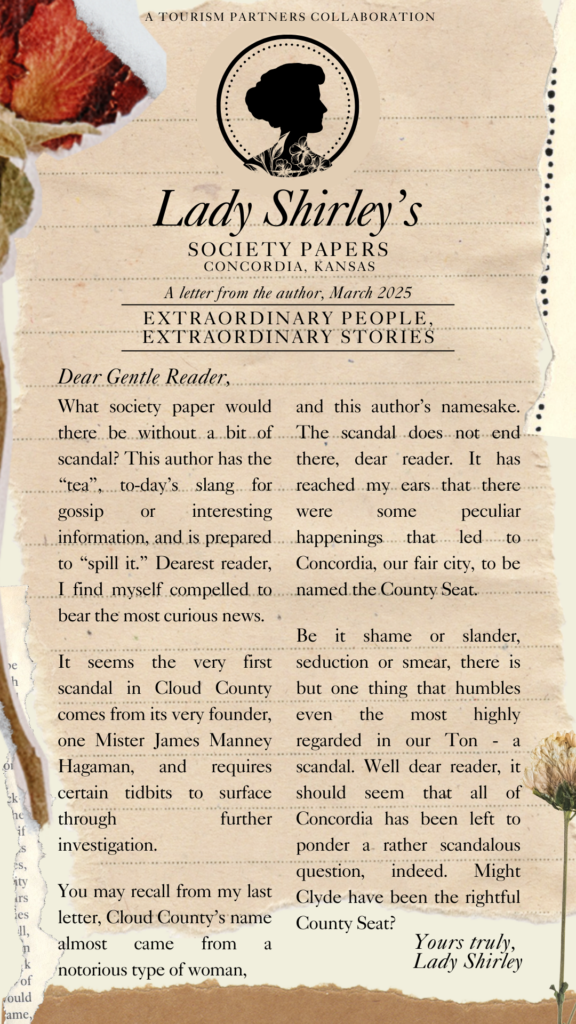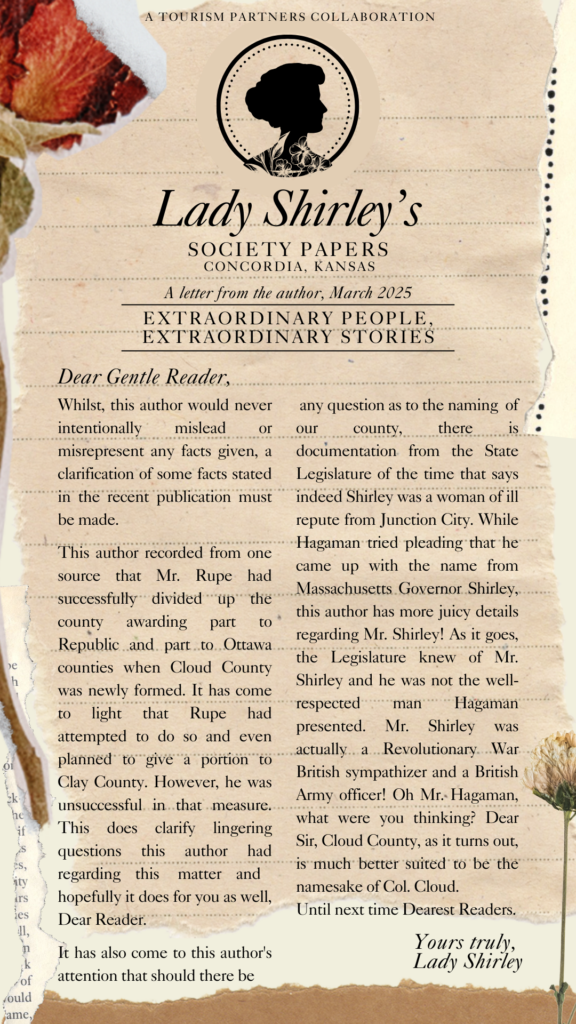The Second Edition of the Lady Shirley Society Papers is here! Last month, Lady Shirley dazzled us with a story of Cloud County’s beginnings. This month she reveals what one man, Concordia’s founder, went through to make Concordia a town. Mr. J.M. Hagaman, beloved founder or scoundrel? Follow Lady Shirley each month as she “spills the tea” on stories about Concordia and Cloud County’s people and events of the past, present, and glimpses into the future.

LAWYER, EDITOR, FOUNDER
J. M. Hagaman, with his wife, Mary, settled in Cloud County in 1860 at the age of 30, just 6 years before Cloud County separated from Washington County and 11 years before the founding of Concordia. He was a lawyer, land agent, newspaper editor, and Concordia’s founder. Mr. Hagaman was also quite the politician. He was the first city clerk and represented Cloud County in the Kansas House of Representatives. He was a 2-term mayor of Concordia and spent 5 terms on the city council. All the makings of a respectable man.
HONORABLE OR VINDICTIVE
The name of J. M. Hagaman occurs frequently upon the pages of history of Concordia as its founder. By the time of his passing, at the age of 76, J. M. Hagaman was a well-respected member of the Ton, known to every household. Often referred to, not as Mr. Hagaman, but as Honorable J. M. Hagaman, history draws him as an active supporter of the success of Cloud County and Concordia.
But, dear reader, this author has uncovered some dirt.
He received a limited education at the family mill and at the age of sixteen years had acquired the same knowledge required by public schools. Though he did not take a collegiate course, his extensive travel taught him many things in the ways of the world. He set out from New York for the frontier of Kansas with his family and a small group of friends.
At Marysville, Ks, his party was warned Indian depredations were of common occurrence along the Republican, only a few days before a family was murdered by them. These stories nearly discouraged the party to proceed, but not Hagaman. He had heard the tales before, but the opportunity was too great a motivation. Having little money, opportunity to acquire work and secure funds to lay claim to the land, they pressed westward toward promise of buffalo. If not for the fascination for and the desire to hunt the buffalo, the journey may have ended long before. Whilst much excitement happened in the 6 years between Hagaman’s arrival to our area and the founding of this fair county and beloved Ton, this author shall skip ahead a bit to just before the founding. Dearest reader, this is where things get interesting, at least from this author’s perspective.
From the very beginning of the formation of the county, Hagaman appears quick to anger. He desperately wanted to be the first Shirley County representative in the state legislature but lost that election to a man from Clyde named John B. Rupe. Mr. Hagaman soon became suspicious of Clyde due to the behavior of Mr. Rupe. Rupe divided the newly formed county, awarding the northern half to Republic and the southern half to Ottawa. Hagaman was certain that move was to guarantee that Clyde be the County Seat. That appears quite likely. Rupe also didn’t care for the name Shirley, which this author takes particular exception to. Rupe fabricated a story that Shirley was named for a prostitute, when in fact, it was for the well-respected Massachusetts Governor Shirley. Rupe’s bill passed however, changing the name to Cloud after Col. William F. Cloud, respected Civil War officer. Hagaman was indeed irate. He had no ill will toward Col. Cloud, but he was certain Rupe changed the name as a display of power. Hagaman’s prejudice against Clyde was mounting.
Enter a Mr. Moses Heller of Clyde. Clyde was already a city by this time. It is said that Mr. Hagaman and Mr. Heller were not friendly acquaintances. Moses Heller was living at Elk Creek in 1860. According to Mr. Heller he was the first settler of the County. Mr. Hagaman vehemently disagreed and seemingly took personal exception to his claim. Years later, when Hagaman owned the Concordia Blade Newspaper, he wrote extensively on the subject of Mr. Heller’s false claims in extreme terms of deliberate petty larceny, stealing claims to be the first settler, and spreading many untruths. Why Mr. Hagaman took such exception with Mr. Heller must have reached far beyond this first settler claim. He went into great detail with many witness testimonies that Heller was not the first settler, which was all printed in the newspaper. It is with slight amusement to this author that later, Mr. Hagaman retracted his accusations after Heller admitted he was not the first settler, nor had he ever publicly claimed to be so.
This author would be curious to find more details on the feud as his behavior seems deeply personal in nature, or perhaps just politically driven. Mr. Heller was a man held in high regard in Clyde as one of the most prominent of the first settlers, one even admiring his great pluck and energy for a man of advanced age. He was the first postmaster, carrying mail from Clyde to Clifton and even to Clay Center in his hat! Mr. Heller held a seat on the first board of commissioners. He was fondly called “Uncle Heller” by many citizens. This doesn’t sound like a man whom Mr. Hagaman should have feared or slandered so publicly.
What might the underlying story be? Was he simply bitter toward Rupe and Heller, or all of Clyde by default?
Mr. Hagaman finally won his seat in the state legislature in 1868, just over two years before Concordia would become a city. It is thought that his win may have eased his ill feelings toward Clyde. He decided Clyde was likely the best fit for the county seat. He began the process of purchasing land to build a hotel. His offer was accepted at a respectable price, but before the transaction could be completed, the town changed the terms, the location, and the price. In a book authored by Janet Pease Emery, “It Takes People to Make a Town” she begins, “Jim Hagaman was through with Clyde. He swore that town would never be county seat, and it never was.” She also states, “If it took every ox, cow and horse he owned, he’d see that the courthouse went elsewhere – even if he had to build a town himself. Madder than hops, Hagaman took out a claim in Lincoln Township and founded Concordia.”
Now, there were three early settlements in Cloud County, Elk Creek (now Clyde), Elm Creek (now Ames), and one at Lake Sibley (just north and west of Concordia). Furious with Clyde, Hagaman set himself the first to try to establish a settlement in what is now Concordia. Hagaman knew he needed to act quickly if he wanted to draw the county seat away from Clyde. He and two other men set out to plat a section of land and claimed it for a town, if only on paper for the time being. Knowing that the majority of voters of the county were concentrated north of the river, Hagaman gave the honor of naming thenewly formed paper town to Cap Snyder, who promised him votes in the county seat election. The town was named “Concordia” meaning harmony and peace. Oh, what irony that a town named peace would be formed with so much deception and trickery. Using his newly elected power, he had the Government Land Office moved from Junction City to the still paper town of Concordia.
Clyde, Concordia, and Sibley were contestants to become the county seat and an election was held. Clyde, being the first city in the county, seemed the clear choice. The settlers north of the river wanted Clyde to be the County Seat, while those south of the river wanted Concordia. Knowing there were more voters on the north side, Hagaman pulled a sly trick. Lake Sibley voters were north of the river. Mr. Hagaman caused a jug of whiskey to be placed at Sibley. Some accused Hagaman of allowing non-residents to vote, others said he used the whiskey to entice voters his direction or to entice them to drink so much that they wouldn’t be able to place a vote at all. Concordia ended up winning the election before a single building, aside from the Hagaman homestead, was ever built. What scandal! Wouldn’t these findings, with recent years’ political cries of election fraud, have outraged to-day’s reader? Might Clyde have truly been the rightful County Seat? Perhaps the trickery ‘tis but a tale and no fraud was committed at all. Only one man truly knows the events of that day, and dear Mr. Hagaman shall not be confirming much from the grave.
The question of just what sort of character a man so revered in his later days of Concordia’s history still haunts this author’s thoughts. Mrs. Emery goes on in her book “James M. Hagaman was smart, inventive, unpredictable, quarrelsome, vindictive.” He knew quite well that Clyde was the better fit for the County Seat. The wit and cunning a man must have to create a town with nothing more than a paper plan and gain the County Seat! Convincing congress to move the Land Office from Junction City to Concordia in July 1970, while Concordia was still just a paper town, is perhaps a bit conniving, or perhaps it was of great intelligence that others found themselves jealous. The official opening of the Republican Land District Office was January 16, 1871, becoming the first business to open, and by the end of that first day 106 homesteads had been entered and 180 pre-emption declaratory statements filed. Concordia became officially established, filed with the Office of the Cloud County Register of Deeds, short months later (some say March some say August) in 1971.
Within the next two years, it would be filled with businesses, a school, have its first mayor, a railway, and a major roadway. Sweet success! This author is still left with questions unanswered. How did a man without higher education become a lawyer? What changed throughout his life that the ruthless, vindictive man became honorable and highly regarded? This author believes Janet Pease Emery was correct – he was smart, quarrelsome, and still an inventive founder, desperate for a better life on the frontier.
NEW INFO HAS COME TO LIGHT
Lady Shirley gathers her information from as many places and as any true Society Paper author, she doesn’t reveal her sources. However, she has recently learned some new information regarding the newest edition regarding Mr. Rupe and Mr. Hagaman. She has asked we release this clarification.

We would also encourage you to always bring forth interesting facts Lady Shirley may be unaware of in future issues. We will pass them along to her. Exploring history is exciting! We know Florence Girard at the Cloud County Museum has even more scandalous stories about Mr. Hagaman if you’re interested in learning more. She would love talking to you!
Lady Shirley’s Society Papers are a Concordia Tourism Partners Collaboration.

Information gathered is intended to be factual and entertaining compiled from multiple print sources and interviews of those who remember our histories. For more information on resources, please contact Cloud County Tourism.